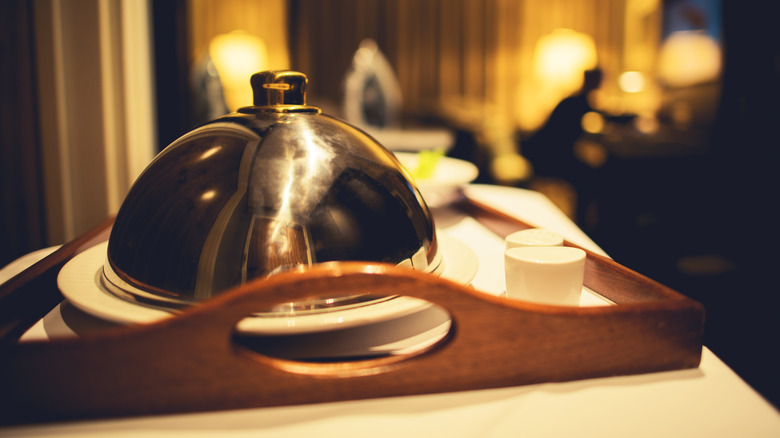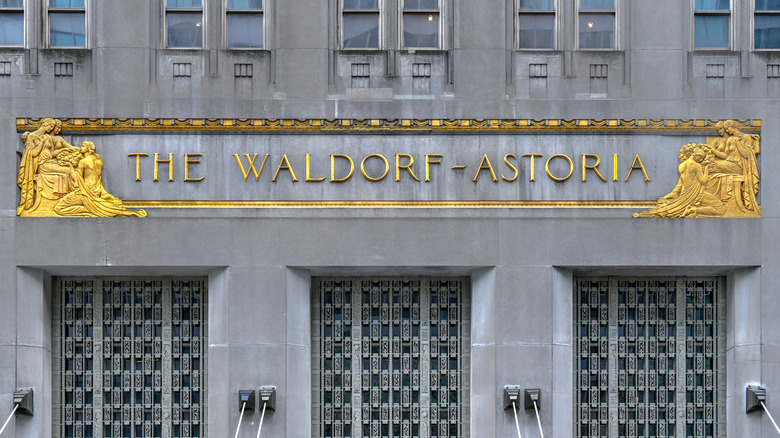The Luxurious Origins Of Room Service Meals
The great perk of hotels is the fact that they not only accept laziness but facilitate it. Within those walls, you have no obligation to make the bed, wash towels, or do dishes. It's a rare taste of royal life to be savored. There is no feature of hotel life that better exemplifies this than the glorious institution of room service. No vacation would be complete without a groggy morning call to the front desk, beckoning pancakes to your door so that you can stuff your mouth before facing the world. With the touch of a dial, you can enjoy not only breakfast in bed, but lunch, dinner, dessert, and a late-night snack.
Does room service have its drawbacks? Of course — everything does. The trip from a hotel's ground floor restaurant up to your room can spoil certain foods, but soggy fries aside, room service is a luxury that most of us would enjoy having every day — if only for the dirty dishes it spares us from washing.
It might surprise you to learn that the institution of room service as we know it only emerged in the last century. What's more, it might not survive to see the next.
Modern room service began at the Waldorf Astoria
The story of room service begins at one of the world's most famous hotels in the world, the Waldorf Astoria in New York City. Its history goes back to the 1890s when rival cousins William Waldorf Astor and John Jacob Astor IV built competing hotels next to each other. Town & Country reveals that the cousins eventually resolved their differences and conjoined their hotels via a corridor before John died aboard the Titanic. Both hotels were eventually ditched and their plot was taken over by the Empire State Building. A new Waldorf Astoria opened in 1931, occupying an entire Manhattan block. At the time, it was the largest hotel in the world, catering to an elite clientele, including celebrities and presidents (via DuJour).
The Waldorf Astoria earned its luxurious reputation by marking a number of firsts in the hospitality business. According to TailWind, the hotel originally had 2,200 rooms, of which no two were alike, and it was the first hotel in the world wired for electricity. Its fine dining experience matched the quality of its lodgings, going far beyond the namesake Waldorf Salad. It was the first hotel to require reservations at its restaurant, The Palm Room, and was also the first hotel to hire female chefs and offer a children's menu. But its most famous contribution to the hospitality industry was being the first hotel with room service. This further helped to attract celebrities and socialites because in-room dining offered an unprecedented level of privacy.
The future of room service looks bleak
Unfortunately, it seems that the history of hotel room service may prove to be shorter than we think. NerdWallet points out that providing room service requires a hotel to acquire extra kitchen space, equipment, and permits. These additional expenses are passed along to the customers in the form of outrageously high prices on room service menus, where a bowl of cereal with milk can go for as much (if not more) as $10. There is also the issue of staffing, which is a major problem across the hospitality industry at the moment. The U.S. Bureau of Labor Statistics reveals that the leisure and hospitality sector experienced brutal losses at the onset of the pandemic that they have yet to recover from.
A key factor that could prevent room service from ever recovering its COVID-19 losses is the rise of delivery apps, which were already draining business before the pandemic. NerdWallet notes that delivery apps provide cheaper, and sometimes better, food than hotel room service. This has led some hotels to form promotional partnerships with delivery apps. Hyatt partnered with GoPuff in 2021 and Marriott teamed up with Uber Eats to provide special perks for guests who order delivery to their rooms. With these developments, it appears that room service, at least as we know it, may not be around for much longer.


